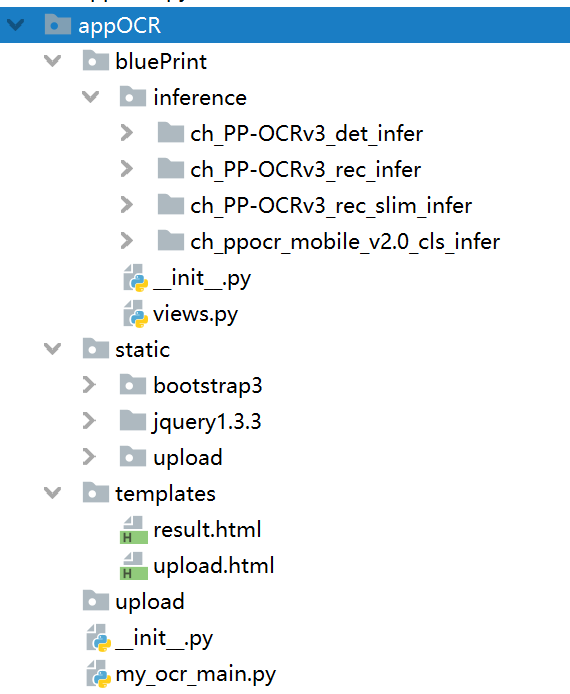PaddleOCR学习笔记2-初步识别服务
今天初步实现了网页,上传图片,识别显示结果到页面的服务。后续再完善。
采用flask + paddleocr+ bootstrap快速搭建OCR识别服务。
代码结构如下:

模板页面代码文件如下:
upload.html :
1 2 3 4 5 6 7 8 9 10 11 12 13 14 15 16 17 18 19 20 21 22 23 24 25 26 27 28 29 30 31 32 33 34 35 36 37 38 39 40 41 42 43 44 45 46 47 48 49 50 51 52 53 54 55 56 57 58 59 60 61 62 63 64 65 66 67 68 69 70 71 72 73 74 75 76 77 78 79 | <!DOCTYPE html><html><meta charset="utf-8"><head> <title>PandaCodeOCR</title> <!--静态加载 样式--> <link rel="stylesheet" href={{ url_for('static',filename='bootstrap3/css/bootstrap.min.css') }}></link> <style> body { font-family: Arial, sans-serif; margin: 0; padding: 0; } .header { background-color: #f0f0f0; text-align: center; padding: 20px; } .title { font-size: 32px; margin-bottom: 10px; } .menu { list-style-type: none; margin: 0; padding: 0; overflow: hidden; background-color: #FFDEAD; border: 2px solid #DCDCDC; } .menu li { float: left; font-size: 24px; } .menu li a { display: block; color: #333; text-align: center; padding: 14px 16px; text-decoration: none; } .menu li a:hover { background-color: #ddd; } .content { padding: 20px; border: 2px solid blue; } </style></head><body> <div class="header"> <div class="title">PandaCodeOCR</div> </div> <ul class="menu"> <li><a href="http://localhost:5000/uploader">通用文本识别</a></li> </ul> <div class="content"> <!--上传图片文件--> <div id="upload_file"> <form action="http://localhost:5000/uploader" method="POST" enctype="multipart/form-data"> <div class="form-group"> <input type="file" class="form-control" id="upload_file" name="upload_file" placeholder="upload_file"> </div> <div class="form-group"> <button type="submit" class="form-control btn-primary">上传图片文件</button> </div> </form> </div> </div></body></html> |
result.html :
1 2 3 4 5 6 7 8 9 10 11 12 13 14 15 16 17 18 19 20 21 22 23 24 25 26 27 28 29 30 31 32 33 34 35 36 37 38 39 40 41 42 43 44 45 46 47 48 49 50 51 52 53 54 55 56 57 58 59 60 61 62 63 64 65 66 67 68 69 70 71 72 73 74 75 76 77 78 79 | <!DOCTYPE html><html><meta charset="utf-8"><head> <title>结果</title> <!--静态加载 样式--> <link rel="stylesheet" href={{ url_for('static',filename='bootstrap3/css/bootstrap.min.css') }}></link> <style> body { font-family: Arial, sans-serif; margin: 0; padding: 0; } .header { background-color: #f0f0f0; text-align: center; padding: 20px; } .title { font-size: 32px; margin-bottom: 10px; } .menu { list-style-type: none; margin: 0; padding: 0; overflow: hidden; background-color: #FFDEAD; border: 2px solid #DCDCDC; } .menu li { float: left; font-size: 24px; } .menu li a { display: block; color: #333; text-align: center; padding: 14px 16px; text-decoration: none; } .menu li a:hover { background-color: #ddd; } </style></head><body> <div class="header"> <div class="title">PandaCodeOCR</div> </div> <ul class="menu"> <li><a href="http://localhost:5000/uploader">通用文本识别</a></li> </ul> <div class="row"> <!--显示上传的图片--> <div class="col-md-6" style="border: 2px solid #ddd;"> <span class="label label-info">上传图片</span> <!--静态加载 图片--> <img src="{{ url_for('static', filename = result_dict['filename'])}}" alt="show_img" class="img-responsive"> </div> <div class="col-md-6" style="border: 2px solid #ddd;"> <!--显示识别结果JSON报文列表--> <span class="label label-info">识别结果:</span> {% for line_str in result_dict['result'] %} <p class="text-left">{{ line_str['text'] }}</p> {% endfor %} </div> </div></body></html><!--静态加载 script--><script src={{ url_for('static',filename='jquery1.3.3/jquery.min.js')}}></script> |
主要视图代码文件如下:
views.py :
1 2 3 4 5 6 7 8 9 10 11 12 13 14 15 16 17 18 19 20 21 22 23 24 25 26 27 28 29 30 31 32 33 34 35 36 37 38 39 40 41 42 43 44 45 46 47 48 49 50 51 52 53 54 55 56 57 58 59 60 61 62 63 64 65 66 67 68 69 70 71 72 73 74 75 76 77 78 79 80 81 82 83 84 85 86 87 88 89 90 91 92 93 94 95 96 97 98 99 100 101 102 103 104 105 106 107 108 109 110 111 | import jsonimport osimport timefrom . import blue_taskfrom flask import Flask, render_template, requestfrom paddleocr import PaddleOCRfrom PIL import Image,ImageDrawimport numpy as np'''自定义模型测试ocr方法'''def test_model_ocr(img): # 返回字典结果对象 result_dict = {'result': []} # paddleocr 目前支持的多语言语种可以通过修改lang参数进行切换 # 例如`ch`, `en`, `fr`, `german`, `korean`, `japan` # 使用CPU预加载,不用GPU # 模型路径下必须包含model和params文件,目前开源的v3版本模型 已经是识别率很高的了 # 还要更好的就要自己训练模型了。 ocr = PaddleOCR(det_model_dir='./inference/ch_PP-OCRv3_det_infer/', rec_model_dir='./inference/ch_PP-OCRv3_rec_infer/', cls_model_dir='./inference/ch_ppocr_mobile_v2.0_cls_infer/', use_angle_cls=True, lang="ch", use_gpu=False) # 识别图片文件 result0 = ocr.ocr(img, cls=True) result = result0[0] for index in range(len(result)): line = result[index] tmp_dict = {} points = line[0] text = line[1][0] score = line[1][1] tmp_dict['points'] = points tmp_dict['text'] = text tmp_dict['score'] = score result_dict['result'].append(tmp_dict) return result_dict# 转换图片def convert_image(image, threshold=None): # 阈值 控制二值化程度,不能超过256,[200, 256] # 适当调大阈值,可以提高文本识别率,经过测试有效。 if threshold is None: threshold = 200 print('threshold : ', threshold) # 首先进行图片灰度处理 image = image.convert("L") pixels = image.load() # 在进行二值化 for x in range(image.width): for y in range(image.height): if pixels[x, y] > threshold: pixels[x, y] = 255 else: pixels[x, y] = 0 return image@blue_task.route('/upload')def upload_file(): return render_template('upload.html')@blue_task.route('/uploader', methods=['GET', 'POST'])def uploader(): if request.method == 'POST': #每个上传的文件首先会保存在服务器上的临时位置,然后将其实际保存到它的最终位置。 filedata = request.files['upload_file'] upload_filename = filedata.filename print(upload_filename) #保存文件到指定路径 #目标文件的名称可以是硬编码的,也可以从 request.files[file] 对象的 filename 属性中获取。 #但是,建议使用 secure_filename() 函数获取它的安全版本 img_path = os.path.join('upload/', upload_filename) filedata.save(img_path) print('file uploaded successfully') start = time.time() print('=======开始OCR识别======') # 打开图片 img1 = Image.open(img_path) # 转换图片, 识别图片文本 # print('转换图片,阈值=220时,再转换为ndarray数组, 识别图片文本') # 转换图片 img2 = convert_image(img1, 220) # Image图像转换为ndarray数组 img_2 = np.array(img2) # 识别图片 result_dict = test_model_ocr(img_2) # 识别时间 end = time.time() recognize_time = int((end - start) * 1000) result_dict["filename"] = img_path result_dict["recognize_time"] = str(recognize_time) result_dict["error_code"] = "000000" result_dict["error_msg"] = "识别成功" # return json.dumps(result_dict, ensure_ascii=False), {'Content-Type': 'application/json'} # render_template方法:渲染模板 # 参数1: 模板名称 参数n: 传到模板里的数据 return render_template('result.html', result_dict=result_dict) else: return render_template('upload.html') |
启动flask应用,测试结果如下:








【推荐】国内首个AI IDE,深度理解中文开发场景,立即下载体验Trae
【推荐】编程新体验,更懂你的AI,立即体验豆包MarsCode编程助手
【推荐】抖音旗下AI助手豆包,你的智能百科全书,全免费不限次数
【推荐】轻量又高性能的 SSH 工具 IShell:AI 加持,快人一步
· winform 绘制太阳,地球,月球 运作规律
· 超详细:普通电脑也行Windows部署deepseek R1训练数据并当服务器共享给他人
· 上周热点回顾(3.3-3.9)
· TypeScript + Deepseek 打造卜卦网站:技术与玄学的结合
· AI 智能体引爆开源社区「GitHub 热点速览」